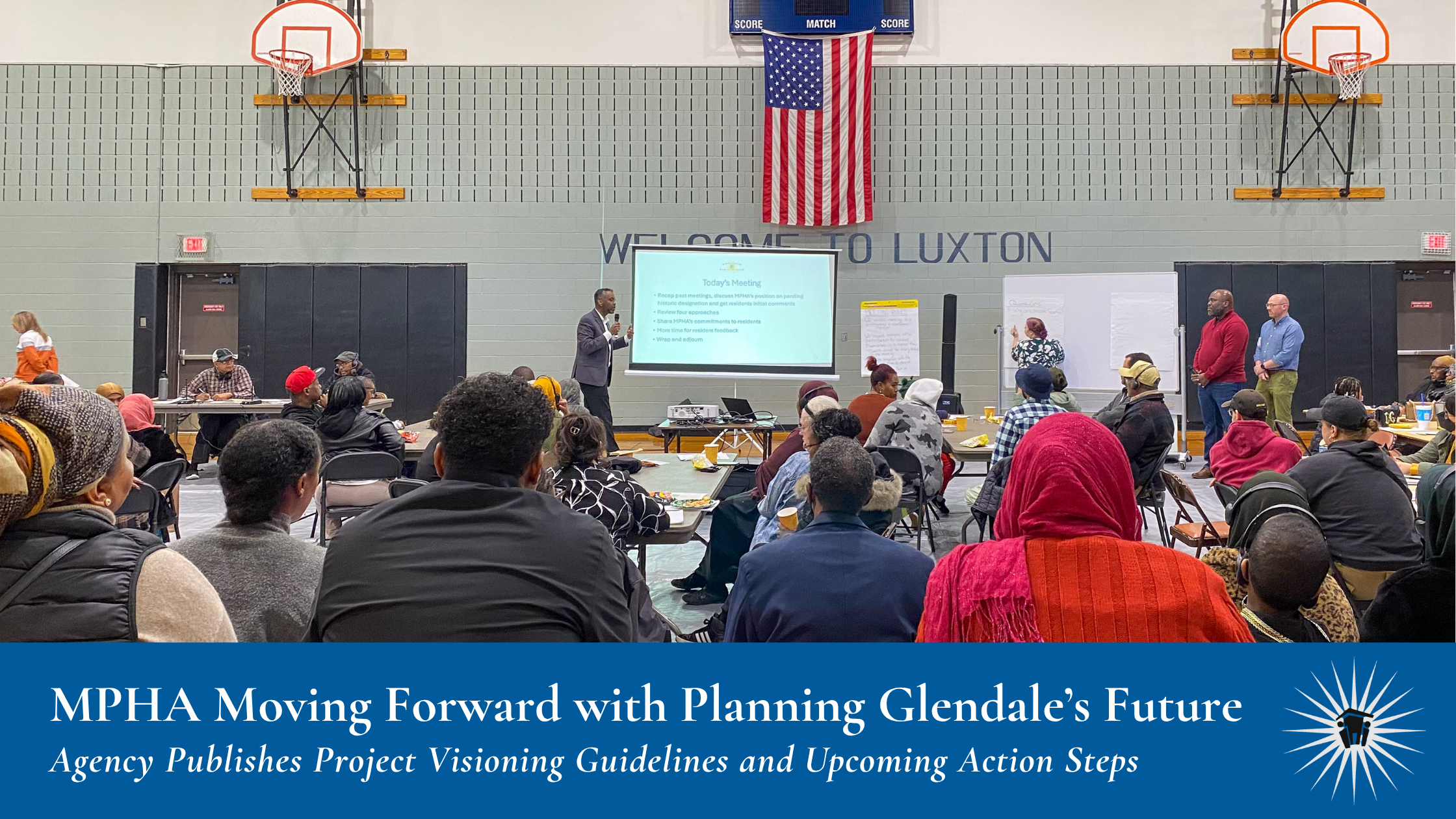Since late 2024, MPHA has hosted a series of resident meetings to discuss the future of Glendale. During these conversations, residents shared their love of the Glendale community, a deep appreciation for their homes, and a recognition that their homes do not meet their current needs and require improvements.
Residents shared the things they like about their homes including the front doors, backyards, community green spaces, and nearby parks, transit, schools, and amenities. But residents also shared stories about the lack of accessibility limiting mobility-impaired residents, large families with a single bathroom, kitchens that are too small, and needing better indoor air quality and air conditioning.
In fact, in addition to a $22 million capital backlog across the community’s 184 townhomes, the Glendale Townhomes do not meet U.S. Department of Housing and Urban Development (HUD) accessibility requirements or the Uniform Federal Accessibility Standards (UFAS). The homes also fail to meet the basic design standards set by Minnesota Housing for affordable housing new construction, having fewer bathrooms and smaller kitchens than Minnesota Housing’s design standards dictate.
Through these conversations it is clear: Glendale residents deserve better.
That’s why, following several months of community meetings, MPHA staff are taking the next steps in creating a plan for Glendale’s future. This includes agency staff beginning to work with architects and design teams to explore future construction options that center resident priorities, increase the livability of homes, maintain neighborhood amenities, and enhance the Glendale community.
Over the coming months, MPHA will take a variety of steps advancing this work. The first step will begin this fall with MPHA hiring an architect and design team to explore design options. These teams will begin studying Glendale to understand what rehabilitation with additions to existing homes could look like or what kind of new buildings could be built on site.
Later this fall, MPHA staff will establish a resident advisory group to help guide the future of Glendale. This working group will allow residents to provide more detailed advisement on everything from project options, designs and finishes used on surfaces throughout the new homes to ongoing broader resident engagement approaches and relocation. This is a model MPHA has used with great success in both Family Housing Expansion Project and the Spring Manor redevelopment.
In addition to the resident advisory group, MPHA will host additional community meetings to discuss progress and gather additional feedback before finalizing a plan for Glendale’s future, tentatively in summer 2026. At that time, MPHA staff will begin seeking necessary city, state, and federal approvals to advance a major construction project at Glendale.
To help guide this work in the coming months, MPHA developed a set of principles and action steps. These visioning guidelines are developed from the resident commitments MPHA staff shared with residents this spring and refined from the feedback residents provided during recent resident meetings. It reflects both the desires and hopes for improvements at Glendale and the concerns residents have repeatedly shared about relocation, displacement, and their ability to return to Glendale as a part of any major construction project.
These principles and action steps serve as a framework for guiding the next steps at Glendale:
Principle #1: Create Dignified Housing for the Existing 600 Glendale Residents That Reflect Their Priorities and Will Help Meet the Needs of Families on MPHA’s Family Housing Waitlist.
Action Steps:
- Explore the rehabilitation with additions to existing homes and building new homes.
- Ensure any project design increases the livability of homes and center resident priorities.
- Ensure project design maintains neighborhood amenities and fosters a connected community.
- Explore options to add homes with more and less bedrooms and single-story accessible homes.
- Explore construction phasing approaches to limit the need for off-site relocation during construction.
- Ensure project design meets state and federal accessibility standards to the greatest extent feasible.
- Explore every option available to help MPHA get more ongoing federal funding to support Glendale, including using HUD’s Rental Assistance Demonstration (RAD) and Section 18 programs.
- Explore city, county, state, and federal financing available to help fund future construction at Glendale.
Principle #2: Center Resident Priorities and Voices in Every Project Phase—Concept to Completion.
Action Steps:
- Create and engage a resident advisory group that will represent the broader community and work with MPHA through planning and construction, relocation, and broader resident engagement activities.
- Encourage the formation of a Glendale resident council and support during and after construction.
- Develop a resident relocation contract detailing MPHA’s commitments to residents and resident’s federally protected rights.
- Work one-on-one with every resident to develop a relocation option that meets their family’s needs.
- Ensure the following resident protections are honored as a part of any future construction:
- Residents will continue to pay rent equal to 30 percent of their adjusted income.
- Residents relocated off-site during construction are guaranteed the right to return.
- To the extent possible, residents will be offered an option to remain on-site during construction.
Earlier this week, Glendale residents were mailed this update in both English and Somali. In keeping with the agency’s promise of factual information and transparency with the planning process, Glendale residents can continue to expect regular updates on the agency’s progress and will be informed of and welcomed to community meetings to finalize the plan for Glendale’s future in 2026.



